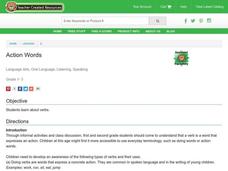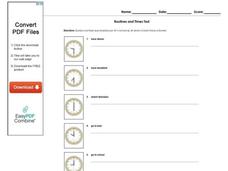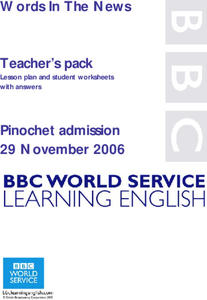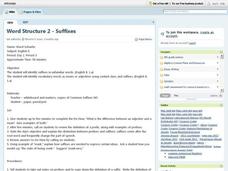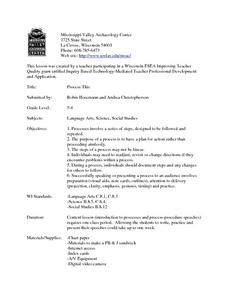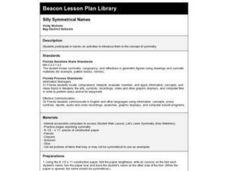Curated OER
Action Words
Students discover that a verb is a word that expresses an action. Students at this age might find it more accessible to use everyday terminology, such as doing words or action words.
Curated OER
Mad Libs; My Trip To Disney World
For this mad lib worksheet, students fill in blanks, following instructions, to complete a mad lib activity about a trip to Disneyland. Worksheet contains links to additional activities.
Curated OER
Geo-Town
Second graders use a checklist to construct a Geo-Town map including a compass rose, a map key, and a paragraph about a walk around Geo-Town, using appropriate geometric and directional vocabulary to identify the two-dimensional figures...
Curated OER
Daily Routines
In this daily routines worksheet, students examine 7 clocks. Next to each clock there is a phrase about what will happen at that time of day, such as "have dinner." Students apparently write the time and activity in a sentence. Note: The...
Curated OER
Results In On Mock Election
Students examine the two presidential candidates in 2000, and identify their own stance on campaign issues. They create fictional candidates that represent their beliefs, and write campaign speeches from their point of view.
Curated OER
Our Glittery Growing Garden!
Young scholars answer a series of questions about the letter G. They practice the sound that G makes and trace a letter G. They decorate their letter G with glue and glitter. They listen to a story about Plainting a Rainbow.
Curated OER
Describing Words
First graders brainstorm adjectives, recognize adjectives within text read by teacher, identify sentences that contain adjectives using Hyperstudio stack, and write two descriptive sentences for abstract image they create.
Curated OER
Aggravating Adverbs Too
Fourth graders explore how to use the correct forms of adverbs to compare actions.
Curated OER
Rewriting a Dialogue (removing quotes)
This is a great activity! Upper elementary learners read a dialogue-driven passage. Then, they rewrite lines of dialogue by removing the quotation marks and shifting the verb tense to past. Grammar and great writing skills all in one. An...
Curated OER
Words In The News
A complete resource from BBC World Service provides informational text for English or ESL classes to teach vocabulary, grammar, and reading skills. Learners participate in small group work, whole class discussions, and role-plays to...
Curated OER
Parts of a Friendly Letter
The art of writing a letter has not been lost to email and texting! Teach kids how to format a friendly letter with a presentation about the parts of a letter, as well as prompting them to write a letter about their favorite holiday.
Scholastic
What’s the Good Word? Etymology Project Guidelines
Who named the shapes, or the days of the week? Should words be removed from the dictionary if they're no longer commonly used? Are there too many words in the English language? Language arts students explore these and additional...
Curated OER
Lesson Four: Comparatives and Superlatives
Put on your best smile, or a least a better one, for this lesson on superlatives and comparatives. English language learners first fill out a graphic organizer by finding other people in the class who are taller than they are, shorter...
Curated OER
The Nez Perce War
A lesson which combines the skills of notetaking with a history of the Nez Perce War against the United States Cavalry is here for you. Learners take notes while their instructor lectures them on the information. A quiz is given as a...
Curated OER
Surrealist Games
Students engage in a game of Exquisite Corpse. By looking at a painting by Ren?? Magritte and creating their own Surrealist "room," students further explore the Surrealist idea of placing common objects in unusual locations.
Curated OER
Literary Terms for Sophomore English Vocabulary Assessment
Sophomores record the definitions and examples of a series of literary terms and then create their own example of the word. Designed as an assessment, the presentation could also be used as an introduction or as a review.
Curated OER
Connotation in Propaganda
High schoolers assess persuasive techniques in propaganda. They identify and critique rhetorical devices in primary source documents (sources are not specified, but links to sites that contain various documents are included). Groups make...
Curated OER
Word Structure 2 - Suffixes
Eighth graders identify suffixes in unfamiliar words. They identify vocabulary words as nouns or adjectives using context clues and suffixes. They review the definition of a prefix, along with examples of prefixes and explain the...
Curated OER
Government
Second graders run for various offices. They dress up like a politician, pretend to be running for an office, and tell the students why they should vote for him/her. They explain why it is necessary for a community to have a government
Curated OER
Folklife Around the Year and Around the State
Research how seasonal changes in Louisiana affect learners' lives and the folklife of their communities and the state. They investigate differences in the seasonal round in the regions of Louisiana, including celebrations, festivals,...
Curated OER
Process This
Students chart the steps, including the problem-solving tangent, and discuss the idea of procedures serving to give us a "road map" or guide to help tackle tasks with preparation and forethought.
Curated OER
The Impact of History: A Conversation with a Parent
Seventh graders interview parents about certain historical events. In this historical interview lesson, 7th graders create a web of events about historical events. Students interview their parents or grandparents about the event and...
Curated OER
Silly Symmetrical Names
Fourth graders participate in hands-on activities to introduce them to the concept of symmetry. They make a silly symmetrical picture out of their names after gluing them onto a larger sheet of construction paper. This is a really...
Curated OER
No Sleep
Students explore vocabulary connected to sleep. They participate in a sleep questionnaire, ask and answer questions for the questionnaire, read an article, answer discussion questions, and identify sleep vocabulary from the article.


